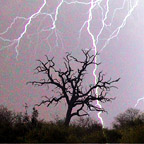 |
Anger Management |
Anger is an emotion that many people fear and try to keep in check. Clients
often come to me asking how to manage their anger. They equate anger
with shouting, as a negative force. They see managing anger as a form
of controlling it but, in reality the best way to manage anger
is to understand it.
Anger in itself is not bad as long as it is expressed appropriately. You
can learn a lot about yourself from understanding your anger and thereby
grow as an individual. Denying the anger may mean denying a
part of yourself which may prevent you from growing as a person.
Why do some people in the same situation get furious while others get
sad or remain calm? Emotions are triggered by your thoughts and memories
associated with a situation. For example: if someone calls you stupid for no
apparent reason, how would you react? Your reaction is based in great part
by automatic thoughts that you may be barely conscious of having. A person
who gets sad may be thinking: "it is true I am always making mistakes,
I am an idiot. No one likes me." A person who gets furious
may generalize: "people are all mean and critical and do not ever
respect me!" Someone who remains calm may conclude "I am
not stupid and he is being rude. I wonder why?"
Many people fear anger as they mistake it for rage. Rage is when you
loss control, shout, scream, even get violent. Rage is that feeling
of wanting to bang your head against a wall. Rage can be seen
as a bottom-line defense against powerlessness so therefore the powerlessness
itself is what needs to be looked at. Anger unlike rage does not mean
a loss of control; anger can be expressed by a sarcastic comments or
simply silence.
Remember that expressing anger is a means of communication. Anger
used appropriately lets other people knew that you want to be treated
with respect. Counseling can help you to understand the underlying
causes of your anger and help you to express it in a construct, productive
manner.